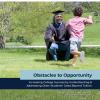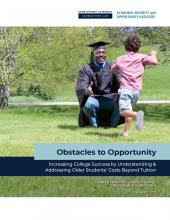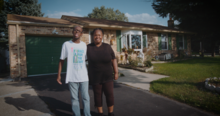0
Report
Community: Postsecondary
May 20, 2021
Higher education offers millions of people the opportunity to improve their financial well-being. However, higher education is prohibitively expensive and can saddle people with insurmountable debt. Costs beyond tuition—such as housing, food, child care, and transportation—are large, essential components of the cost of attending college for students. In order to better understand how these living costs add up and vary, this report offers estimates of costs beyond tuition for older students between the ages of 25 – 45, who make up roughly one-third of college students and face unique barriers to college access and completion. The report shows that the real cost of college for older students is higher than commonly understood, examines older students’ challenges with financial aid and public benefits programs, and offers policy recommendations to address costs beyond tuition and improve college access and success for older students.
Authored by: Vincent Palacios, Casey Goldvale, Chris Geary & Laura Tatum for GEORGETOWN LAW
Topics: Attendance, Community development, Education, Housing, Post-secondary, Stability, Workforce development
 Shared by Housing Is
Shared by Housing Is
Housing Is posted a
on May 20, 2021
Vincent Palacios, Casey Goldvale, Chris Geary & Laura Tatum for GEORGETOWN LAW
Higher education offers millions of people the opportunity to improve their financial well-being. However, higher education is prohibitively expensive and can saddle people with insurmountable debt.
0
Video
Community:
May 18, 2021
The devastating consequences of climate change will continue to impact our everyday lives, testing the resilience of our communities and influencing the processes of how we build housing. PHAs have been on the front-line managing disaster recovery efforts and are well-positioned to be leaders in advancing policies to develop environmentally friendly green infrastructure. This panel will discuss past endeavors to secure safe housing for displaced communities, what steps are required to mitigate future disasters, and how PHAs are designing plans to make greener and more healthier communities.
Authored by: CLPHA
Topics: Community development, Green, Housing
 Shared by Housing Is
Shared by Housing Is
Housing Is posted a
on May 18, 2021
The devastating consequences of climate change will continue to impact our everyday lives, testing the resilience of our communities and influencing the processes of how we build housing.
0
Video
Community:
May 18, 2021
Over the past several years, CLPHA has worked with its members to disseminate information on the best eviction prevention practices and many public housing authorities (PHAs) have made great progress in developing new strategies to keep families housed. The eventual ending of the CDC eviction moratorium provides an opportunity for PHAs to review their eviction prevention strategies. Panelists will review the latest research on COVID-19 and evictions, protecting voucher holders from eviction, and work that PHAs are doing to evaluate their own eviction practices through a racial equity lens.
Authored by: CLPHA
Topics: Community development, COVID-19, Healthy homes, Homelessness, Housing, Legislation & Policy, Racial inequalities
 Shared by Housing Is
Shared by Housing Is
Housing Is posted a
on May 18, 2021
Over the past several years, CLPHA has worked with its members to disseminate information on the best eviction prevention practices and many public housing authorities (PHAs) have made great progress in developing new strategies to keep families housed.
0
Video
Community:
May 18, 2021
Keynote: Michael Bennet (D-Co), Congressional Video Message.
Plenary: Reducing Childhood Poverty.
Following Housing Is' 2019 Summit discussion of reducing childhood poverty and the idea of a university child allowance, this panel will explore the renewed discussion of legislation around a child tax credit and the idea of a universal basic income.
Authored by: CLPHA
Topics: Child welfare, Community development, Housing, Legislation & Policy, Low-income, Racial inequalities, Youth
 Shared by Housing Is
Shared by Housing Is
Housing Is posted a
on May 18, 2021
Keynote: Michael Bennet (D-Co), Congressional Video Message.
Plenary: Reducing Childhood Poverty.
Following Housing Is' 2019 Summit discussion of reducing childhood poverty and the idea of a university child allowance, this panel will explore the renewed discussion of legislation around a c
0
Video
Community:
May 18, 2021
Roundtable: Cross-Sector Efforts on COVID-19.
More than a year into a global pandemic, we continue to see disparities in infections, access to care, and economic supports, with an unequal burden on low-income and communities of color. This roundtable will discuss perspectives from housing, health, and policy for what we have seen and what may be to come, as well as ideas we may enact to create more permanent solutions, in addition to addressing current crises.
Authored by: CLPHA
Topics: CLPHA, Community development, COVID-19, Education, Health, Housing, Partnerships
 Shared by Housing Is
Shared by Housing Is
Housing Is posted a
on May 18, 2021
Roundtable: Cross-Sector Efforts on COVID-19.
More than a year into a global pandemic, we continue to see disparities in infections, access to care, and economic supports, with an unequal burden on low-income and communities of color.
0
Podcast
Community:
Jan 13, 2021
On a day-to-day basis, vulnerable populations suffer from inequities in health, wealth, and education. These same people are then disproportionately impacted by catastrophes ranging from hurricanes to COVID-19, which only serve to underline the great and urgent need for equity across race, gender, and income. In the latest episode of The Intersect, Madeline Colety and Lorine Giangola discuss how Abt’s housing and resilience work is helping clients promote equity.
Authored by: Madeline Colety & Lorine Giangola for ABT ASSOCIATES
Topics: Advocacy, Community development, Education, Food insecurity, Health, Healthy homes, Homelessness, Housing, Low-income, Partnerships, Racial inequalities
 Shared by Housing Is
Shared by Housing Is
Housing Is posted a
on Jan 14, 2021
Madeline Colety & Lorine Giangola for ABT ASSOCIATES
On a day-to-day basis, vulnerable populations suffer from inequities in health, wealth, and education.
0
Report
Community: Seniors
Dec 3, 2020
During the COVID-19 pandemic, service coordinators played a pivotal role in the support of older adult residents of publicly funded housing properties. Some independent housing operators employ service coordinators to increase residents’ self-sufficiency, physical security, social connections, and the delivery of long-term community-based supportive services. This report presents results from a survey conducted between June 23 and July 17, 2020 to explore the experiences of these service coordinators during the early months of COVID-19. At the time of the survey, about one-third of respondents were aware of at least one resident on the property who had tested positive for COVID-19.
The survey revealed the pandemic’s impact on the lives of older residents of publicly funded housing. Professional support systems that typically provided personal assistance and medical care were interrupted, threatening residents’ physical and mental health. Transportation and resource acquisition systems were also unsettled, creating barriers to activities of independent living such as shopping to acquire food and medication. Social challenges were particularly acute during the early months of the pandemic. Residents demonstrated signs of anxiety and loneliness as their typical experiences of community life were muted. And, while health guidelines and novel benefit programs emerged at a steady clip, communication systems had to be modified from largely in-person formats to accommodate a population of older adults without consistent access to technological platforms.
Authored by: Samara Scheckler for THE JOINT CENTER FOR HOUSING STUDIES OF HARVARD UNIVERSITY
Topics: Community development, Housing, Mental health, Seniors
 Shared by Housing Is
Shared by Housing Is
Housing Is posted a
on Dec 3, 2020
Samara Scheckler for THE JOINT CENTER FOR HOUSING STUDIES OF HARVARD UNIVERSITY
During the COVID-19 pandemic, service coordinators played a pivotal role in the support of older adult residents of publicly funded housing properties.
0
Report
Community: Youth
Nov 3, 2020
As housing costs have escalated and inequities persist across the country, many young people need flexible, empowerment-based investments to get stably housed and onto a path to thriving. To this end, direct financial assistance (“cash transfers”) with other supports offer a promising solution grounded in a robust global evidence base. The circumstances of COVID-19 amplify the importance of developing and evaluating youth-informed approaches to doing things differently.
This report shares results and implications of a year-long research and stakeholder engagement process that Chapin Hall conducted in collaboration with Point Source Youth to inform the development of a Direct Cash Transfer Program (DCTP) for youth experiencing homelessness. We look forward to piloting and rigorously evaluating a program based on these findings, starting in NYC.
Authored by: Matthew Morton for CHAPIN HALL AT THE UNIVERSITY OF CHICAGO
Topics: Community development, Funding, Homelessness, Housing, Low-income, Youth
 Shared by Housing Is
Shared by Housing Is
Housing Is posted a
on Nov 3, 2020
Matthew Morton for CHAPIN HALL AT THE UNIVERSITY OF CHICAGO
As housing costs have escalated and inequities persist across the country, many young people need flexible, empowerment-based investments to get stably housed and onto a path to thriving.
0
Report
Community:
Jun 6, 2019
Trends in Housing Assistance and Who it Serves
Authored by: PAHRC
Topics: Community development, Disabilities, Education, Funding, Health, Homelessness, Housing, Legislation & Policy, Low-income, Partnerships, Research, Seniors, Workforce development, Youth
 Shared by Keely Stater
Shared by Keely Stater
Keely Stater posted a
on Sep 10, 2019
Trends in Housing Assistance and Who it Serves
0
News Article
Community:
Jun 4, 2019
A new study finds that higher percentages of wealthy, Asian, and white residents live in HOAs; and people pay a premium of about 4 percent for homes in HOAs.
Authored by: David Montgomery for CityLab
Topics: Community development, Housing, Legislation & Policy, Racial inequalities, Research
 Shared by Housing Is
Shared by Housing Is
Housing Is posted a
on Jun 6, 2019
David Montgomery for CityLab
A new study finds that higher percentages of wealthy, Asian, and white residents live in HOAs; and people pay a premium of about 4 percent for homes in HOAs.
0
Report
Community:
Apr 3, 2019
Rental affordability is a significant challenge for metropolitan statistical areas (MSAs) across the United States. The vast majority of the units Freddie Mac finances are affordable. Even so, our research shows that supply just hasn’t kept pace with demand in many metros, and that’s pushing affordable rents out of reach for millions of American families.
Authored by: Steve Guggenmos for Freddie Mac Multifamily
Topics: Community development, Housing, Research
 Shared by Housing Is
Shared by Housing Is
Housing Is posted a
on Jun 5, 2019
Steve Guggenmos for Freddie Mac Multifamily
Rental affordability is a significant challenge for metropolitan statistical areas (MSAs) across the United States. The vast majority of the units Freddie Mac finances are affordable.
0
Report
Community:
In fact, Syracuse’s experience feels both unique and all too common for U.S. cities, particularly Great Lakes cities: federally sanctioned housing disinvestment; sprawling outward development; stagnating or declining and
segregated population; fractured local government and school systems; and outdated infrastructure.
Authored by: Anthony Armstrong & Make Communities for The Poverty and Race Research Action Council (PRRAC)
Topics: Community development, Housing, Legislation & Policy, Low-income, Racial inequalities, Research
 Shared by Housing Is
Shared by Housing Is
Housing Is posted a
on May 10, 2019
Anthony Armstrong & Make Communities for The Poverty and Race Research Action Council (PRRAC)
In fact, Syracuse’s experience feels both unique and all too common for U.S.
0
Publication
Community:
Apr 4, 2019
Decades of policy choices and insufficient public and private investment have made the infrastructure needs of these communities acute, especially in many communities of color where past policy choices affected by racism, combined with continuing racial bias and discrimination, have resulted in a lack of needed economic resources.
Authored by: Chye-Ching Huang for The Center on Budget and Policy Priorities
Topics: Community development, Education, Housing, Legislation & Policy, Low-income
 Shared by Housing Is
Shared by Housing Is
Housing Is posted a
on May 2, 2019
Chye-Ching Huang for The Center on Budget and Policy Priorities
Decades of policy choices and insufficient public and private investment have made the infrastructure needs of these communities acute, especially in many communities of color where past policy choices affected by racism, combined with continuing racial bias and discrimination, have resulted in a la
0
News Article
Community:
Apr 26, 2019
In the District of Columbia, low-income residents are being pushed out of neighborhoods at some of the highest rates in the country, according to the Institute on Metropolitan Opportunity, which sought to track demographic and economic changes in neighborhoods in the 50 largest U.S. cities from 2000 to 2016.
Authored by: Marissa J. Lang for The Washington Post
Topics: Community development, Housing, Low-income, Racial inequalities
 Shared by Housing Is
Shared by Housing Is
Housing Is posted a
on Apr 26, 2019
Marissa J. Lang for The Washington Post
In the District of Columbia, low-income residents are being pushed out of neighborhoods at some of the highest rates in the country, according to the Institute on Metropolitan Opportunity, which sought to track demographic and economic changes in neighborhoods in the 50 largest U.S.
0
Publication
Community:
Apr 25, 2019
Adequate, safe, and affordable housing is one of our most basic needs. But in the US, access to housing is not guaranteed. Demand for affordable housing is growing, especially as housing costs increase beyond wage growth in many communities. Hospitals and health systems are stepping in to help fill this gap. Because of their mission orientation, the importance of stable housing on health outcomes, and policy changes initiated by the Affordable Care Act, hospitals and health systems are increasingly investing in and supporting the creation of affordable housing in their communities.
Authored by: Martha Fedorowicz and Kathryn Reynolds for How Housing Matters, The Urban Institute
Topics: Affordable Care Act, Community development, Health, Housing, Low-income
 Shared by Housing Is
Shared by Housing Is
Housing Is posted a
on Apr 25, 2019
Martha Fedorowicz and Kathryn Reynolds for How Housing Matters, The Urban Institute
Adequate, safe, and affordable housing is one of our most basic needs. But in the US, access to housing is not guaranteed. Demand for affordable housing is growing, especially as housing costs increase beyond wage growth in many communities.
0
News Article
Community:
Apr 16, 2019
ProMedica and LISC team up to fund place-based investments in the hope of improving residents’ health. How do they do it?
Authored by: Amanda Abrams for Shelter Force
Topics: Community development, Health, Housing, Place-based
 Shared by Housing Is
Shared by Housing Is
Housing Is posted a
on Apr 23, 2019
Amanda Abrams for Shelter Force
ProMedica and LISC team up to fund place-based investments in the hope of improving residents’ health. How do they do it?
0
Publication
Community:
Apr 10, 2019
Community Land Trusts (CLTs) are nonprofit, community-based organizations that steward land for specific community purposes. They are used to expand and preserve low- and moderate-cost housing, sustain commercial and civic assets, and foster neighborhood engagement through stewardship of the land. Although typically used as an approach for shared equity homeownership, CLTs can also stabilize housing access, increase affordability, revitalize properties in disinvested communities, and enable renters to participate in community governance processes.
Authored by: Kimberly Burrowes for How Housing Matters (Urban Institute)
Topics: Community development, Housing, Low-income
 Shared by Mica O'Brien
Shared by Mica O'Brien
Mica O'Brien posted a
on Apr 11, 2019
Kimberly Burrowes for How Housing Matters (Urban Institute)
Community Land Trusts (CLTs) are nonprofit, community-based organizations that steward land for specific community purposes. They are used to expand and preserve low- and moderate-cost housing, sustain commercial and civic assets, and foster neighborhood engagement through stewardship of the land.
0
Report
Community:
Apr 8, 2019
While the program has changed very little since its inception, the need for the program has increased. In 1975, the number of program grantees stood at 594. Today, the number of grantees stands at 1,268 as more communities qualify to receive direct program allocations. Based on a CDBG Needs Survey conducted by the CDBG Coalition (and discussed later in this report), CDBG grantees have delayed and canceled projects and reduced or permanently eliminated programs because of a lack of CDBG funds. CDBG is an important investment tool for communities and neighborhoods, but program funding must increase to meet local need to ensure CDBG grantee communities are healthy, vibrant and thriving.
Authored by:
Topics: Community development, Funding, Health, Homelessness, Housing, Legislation & Policy, Low-income, Partnerships, Research, Safety, Seniors
 Shared by Housing Is
Shared by Housing Is
Housing Is posted a
on Apr 8, 2019
A report of the CDBG Coalition
While the program has changed very little since its inception, the need for the program has increased. In 1975, the number of program grantees stood at 594. Today, the number of grantees stands at 1,268 as more communities qualify to receive direct program allocations.
0
Interactive
Community:
We're creating the foundations of change. Together, we can provide more families with access to a safe place to live.
Authored by: Freddie Mac, Duty to Serve
Topics: Community development, Housing, Legislation & Policy
 Shared by Housing Is
Shared by Housing Is
Housing Is posted a
on Apr 8, 2019
Freddie Mac, Duty to Serve
We're creating the foundations of change. Together, we can provide more families with access to a safe place to live.
0
Research
Community:
Feb 22, 2019
Thoughtfully developed, accessible communities may boost parent engagement and student outcomes in low-income neighborhoods
Authored by: Rachel Sturtz for University of Colorado Denver
Topics: Community development, Education, Family engagement, Housing, Low-income, Partnerships, Racial inequalities, Transportation
 Shared by Housing Is
Shared by Housing Is
Housing Is posted a
on Apr 4, 2019
Rachel Sturtz for University of Colorado Denver
Thoughtfully developed, accessible communities may boost parent engagement and student outcomes in low-income neighborhoods
0
News Article
Community:
Feb 5, 2019
Building more affordable housing units in the metros that are centers of innovation will increase demand for the wares that fill houses, and increase productivity.
Authored by: Richard Floriday for City Lab
Topics: Asset building, Community development, Housing, Legislation & Policy, Research
 Shared by Housing Is
Shared by Housing Is
Housing Is posted a
on Apr 4, 2019
Richard Floriday for City Lab
Building more affordable housing units in the metros that are centers of innovation will increase demand for the wares that fill houses, and increase productivity.
0
Publication
Community:
Mar 26, 2019
As Wilmington’s Riverside community embarks on an extraordinary revitalization effort, Christiana Care Health System is making an impact on health with a $1 million gift to REACH Riverside Development Corporation that will support community health and youth development programs.
Authored by: Christiana Care News
Topics: Community development, Health, Housing, Low-income, Youth
 Shared by Housing Is
Shared by Housing Is
Housing Is posted a
on Apr 4, 2019
As Wilmington’s Riverside community embarks on an extraordinary revitalization effort, Christiana Care Health System is making an impact on health with a $1 million gift to REACH Riverside Development Corporation that will support community health and youth development programs.
0
News Article
Community:
Mar 31, 2019
Miami is projected to face anywhere from 1 to 3 feet of sea level rise by 2060, and as sea levels rise, higher ground inland has started to look more and more desirable. Much of that higher ground is in the city's poorest neighborhoods, like Liberty City and Little Haiti. The shifting real estate landscape is just one example of how, in Miami, the effects of global warming are not hypothetical predictions but realities of everyday life, prompting action by government, businesses and individuals alike. Across the region, developers are changing how they build, wealthy homeowners are reinforcing their properties, and in communities that are farther from the coast — places like Liberty City — residents are working to make sure they don't have to leave their homes.
Authored by: Ian Stewart and Lulu Garcia-Navarro for NPR
Topics: Community development, Housing, Legislation & Policy, Low-income, Racial inequalities, South
 Shared by Housing Is
Shared by Housing Is
Housing Is posted a
on Apr 4, 2019
Ian Stewart and Lulu Garcia-Navarro for NPR
Miami is projected to face anywhere from 1 to 3 feet of sea level rise by 2060, and as sea levels rise, higher ground inland has started to look more and more desirable. Much of that higher ground is in the city's poorest neighborhoods, like Liberty City and Little Haiti.
0
News Article
Community:
Mar 27, 2019
A shortage of affordable housing on this island territory has forced hundreds of families to remain in damaged and leaky houses during the lengthy recovery effort. The widespread destruction of hotels and public housing, combined with the flood of workers who have rushed to the islands to aid in rebuilding, have pushed rents higher, beyond the means of many disaster victims.
Authored by: Tim Craig for The Washington Post
Topics: Community development, Housing, Low-income, Safety, U.S. Territories
 Shared by Housing Is
Shared by Housing Is
Housing Is posted a
on Apr 2, 2019
Tim Craig for The Washington Post
A shortage of affordable housing on this island territory has forced hundreds of families to remain in damaged and leaky houses during the lengthy recovery effort.
0
News Article
Community:
Mar 26, 2019
Community First! Village is built and run by the nonprofit Mobile Loaves & Fishes to lift the most chronically homeless off the streets and into a place they can call home. They live in about 100 RVs and 125 micro homes arranged on streets with names like "Peaceful Path" and "Goodness Way." Heavy machinery has broken ground on the neighboring 24 acres to add another 310 housing units. When complete, Mobile Loaves and Fishes believes it will be able to provide permanent homes for approximately 40% of the chronically homeless in Austin.
Authored by: Christopher Dawson for CNN
Topics: Community development, Homelessness, Housing, Place-based, South
 Shared by Housing Is
Shared by Housing Is
Housing Is posted a
on Mar 28, 2019
Christopher Dawson for CNN
Community First! Village is built and run by the nonprofit Mobile Loaves & Fishes to lift the most chronically homeless off the streets and into a place they can call home.


 Shared by Housing Is
on May 20, 2021
Shared by Housing Is
on May 20, 2021

 Shared by Housing Is
on May 18, 2021
Shared by Housing Is
on May 18, 2021
 Shared by Housing Is
on May 18, 2021
Shared by Housing Is
on May 18, 2021
 Shared by Housing Is
on May 18, 2021
Shared by Housing Is
on May 18, 2021
 Shared by Housing Is
on May 18, 2021
Shared by Housing Is
on May 18, 2021

 Shared by Housing Is
on Jan 14, 2021
Shared by Housing Is
on Jan 14, 2021

 Shared by Housing Is
on Dec 3, 2020
Shared by Housing Is
on Dec 3, 2020

 Shared by Housing Is
on Nov 3, 2020
Shared by Housing Is
on Nov 3, 2020


 Shared by Keely Stater
on Sep 10, 2019
Shared by Keely Stater
on Sep 10, 2019

 Shared by Housing Is
on Jun 6, 2019
Shared by Housing Is
on Jun 6, 2019

 Shared by Housing Is
on Jun 5, 2019
Shared by Housing Is
on Jun 5, 2019

 Shared by Housing Is
on May 10, 2019
Shared by Housing Is
on May 10, 2019
 Shared by Housing Is
on May 2, 2019
Shared by Housing Is
on May 2, 2019

 Shared by Housing Is
on Apr 26, 2019
Shared by Housing Is
on Apr 26, 2019

 Shared by Housing Is
on Apr 25, 2019
Shared by Housing Is
on Apr 25, 2019

 Shared by Housing Is
on Apr 23, 2019
Shared by Housing Is
on Apr 23, 2019

 Shared by Housing Is
on Apr 8, 2019
Shared by Housing Is
on Apr 8, 2019
 Shared by Housing Is
on Apr 8, 2019
Shared by Housing Is
on Apr 8, 2019

 Shared by Housing Is
on Apr 4, 2019
Shared by Housing Is
on Apr 4, 2019


 Shared by Housing Is
on Apr 4, 2019
Shared by Housing Is
on Apr 4, 2019


 Shared by Housing Is
on Apr 4, 2019
Shared by Housing Is
on Apr 4, 2019


 Shared by Housing Is
on Apr 4, 2019
Shared by Housing Is
on Apr 4, 2019

 Shared by Housing Is
on Apr 2, 2019
Shared by Housing Is
on Apr 2, 2019

 Shared by Housing Is
on Mar 28, 2019
Shared by Housing Is
on Mar 28, 2019
